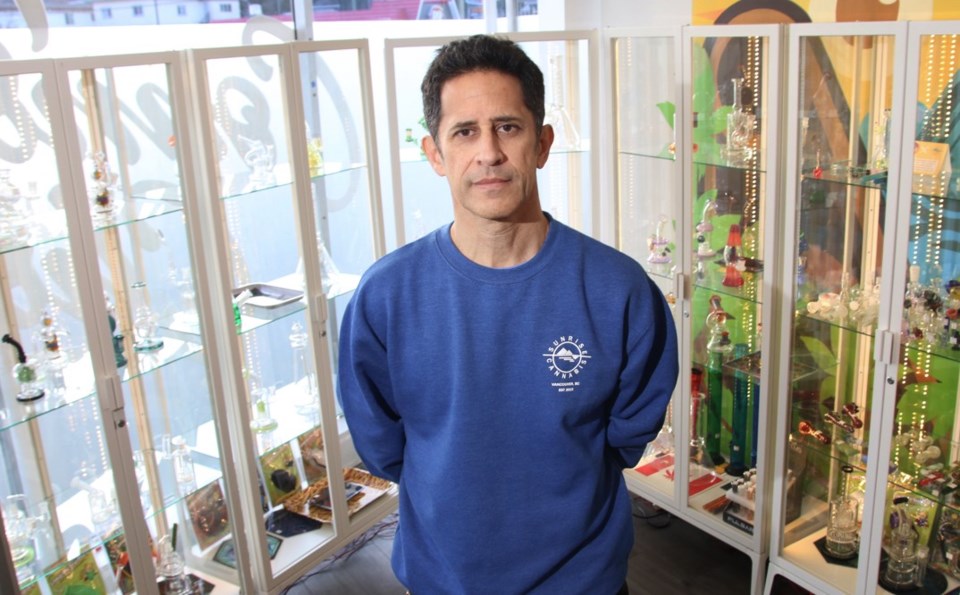Business is tough for a lot of business owners and executives in the retail, tourism and hospitality sectors.
They have been hit with high inflation, pandemic debt, labour shortages, overall cost pressures and sometimes the impact of climate change.
With the B.C. government slated to release its 2024-25 budget on Feb. 22, there are plenty of things that industry principals and their advocates are seeking even if they are doubt their wishes will be fulfilled.
“I don’t find that this government is particularly business friendly so I want to keep my expectations to a dull roar,” said Retail Council of Canada director of government relations Greg Wilson.
The biggest thing that Wilson would like to see from the provincial government is for the government to raise the payroll threshold at which small businesses must start paying the Employers Health Tax.
Businesses that pay employees less than a combined $500,000 are exempt from this tax. Those whose payrolls are valued at between $500,000 and $1,500,000 must pay a 2.95-per-cent tax on the total value of their payrolls minus $500,000. Bigger businesses, with payrolls that exceed $1,500,000, pay a 1.95-per-cent tax on their entire payroll value.
The government brought in this system in 2019 and has not increased the thresholds despite inflation soaring, which has forced employers to pay higher wages in order to attract workers.
“Both the $500,000 threshold and the $1.5 million threshold could be raised,” Wilson said.
He acknowledged that this would mean less revenue for government, but he said that the government has been raking in excess money for years by not raising the tax’ thresholds in line with inflation.
British Columbia Restaurant and Foodservices Association CEO Ian Tostenson said raising the Employers Health Tax payroll thresholds is his biggest request from the B.C. government as well.
“The big issue that everybody has to focus on, and which would really help, is to change the Employers Health Tax payroll thresholds,” he told BIV.
Unlike Wilson, Tostenson said that it would be fair for government to want to extract the same amount of money from the Employers Health Tax.
They could do that by raising the tax rate on bigger businesses, he said.
“The theory is that larger businesses have more capacity to handle it,” said Tostenson.
Many small businesses, in contrast, he said, are “holding on by the skin of their teeth.”
B.C. cannabis sector seeks help in the budget
The B.C. government has never been transparent about how its cannabis retail stores are performing financially.
The British Columbia Liquor Distribution Branch does not reveal its BC Cannabis Stores’ total revenue, costs and the resulting net income or loss.
Cannabis store owners have told BIV that they think that the government is losing money in its retail cannabis operations and that it should therefore get out of the game, and let private retailers shoulder the risk of being in business, and ideally run profitable ventures.
“As a taxpayer, I believe I have a right to know if the government retail cannabis stores are losing money,” said Ehren Richardson, who owns the Sunrise Cannabis store at 2943 Kingsway in 91原创.
He would like to see the government get out of retailing cannabis as well as the wholesale distribution business.
“Five years into legalization, we have a failed policy,” he said.
Some customers ask Richardson for products that he is unable to stock because they are not available at the government warehouse, he said.
He would be able to stock those products if he could buy direct from producers, he added.
The system is inefficient, bureaucratic and a waste of taxpayers’ money, he said.
The government in mid-2022 started to approve specific small craft cannabis producers and allow them to sell direct to retailers, but the government kept its mark-up rates in place so there is no financial advantage for the craft-cannabis suppliers to do that.
If those small producers sell direct to retailers, their costs actually go up because they have to pay for the delivery, while the BCLDB charges the same amount of money in its mark-up rate as if it had incurred delivery costs.
That system is a farce and should be changed, said cannabis retailers, such as Richardson, as well as Retail Cannabis Council of BC executive director Jaclynn Pehota.
“It’s a bit of a cash grab,” she said. “We’ve been asking the government to reexamine that wholesale markup [for direct sales by craft-cannabis producers] because it doesn’t feel as if there’s a real purpose for it.”
Pehota would also like to see the provincial budget provide money to help create a B.C.-grown cannabis designation that would be similar to the British Columbia Vintners Quality Alliance (BCVQA) designation for B.C. wines that meet certain standards.
Another of her requests is to have the government provide money to help create and promote a program for tourists to visit clusters of licensed cannabis producers – in the Okanagan or in the Kootenays – and have a designated trail between the producers, which would sell products at their farm gates.
“It’s really challenging for the actual licensed producers to do that kind of promotional activity because of Cannabis Act [restrictions,]” she said.
B.C. wine sector reeling from climate-related devastation
Painted Rock Estate Winery owner John Skinner has endured substantial setbacks to his operations in the past couple years.
First came the December 2022 deep freeze that pushed temperatures below -20 C in most parts of B.C.’s Interior, and as low as -30 C in Kelowna, West Kelowna and the Shuswap region.
The arctic outflow that put the Okanagan in a similar deep freeze in mid-January was “substantially worse” for Skinner.
“It’s frightening,” he told BIV.
“We did a bud assessment and looked at 1,600 buds. A little over 90 per cent of the primary and secondary buds were dead.”
How much that will translate into a stunted 2024 harvest is yet to be seen, but Skinner confirmed to BIV that he has been approached to sell his winery - something that indicates some people may be trying to cash in on the sector by buying up quality vineyards.
Wine Growers British Columbia (WGBC) estimated that the 2022 deep freeze damaged about 12,681 acres of grape vines and that between 3,814 and 7,492 acres need to be replanted.
It estimated that the average replanting cost would be about $42,360 per acre, so replanting would cost between $162 million and $317 million.
“That is not our ask from government,” WGBC CEO Miles Prodan told BIV. “That is our need.”
He is asking the B.C. government to provide the industry with about $50 million, spread across three years.
That ask may rise if it turns out that the January deep freeze was much worse than the one in 2022.
“It is seemingly worse,” he said. “We’re just looking at the bud damage right now to see, but it was a longer spell. It was maybe not as cold, but it was colder for longer. The damage looks as though it is more widespread than in 2022.”
Industry advocates have range of ideas for government
Countless artists have covered or sampled the O’Jays’ 1973 song For the Love of Money, with its chorus being a simple lyric – a quick repetition of the word “money.”
It could be a soundtrack for what the tourism and hospitality sectors are wanting, given the wide range of ideas for how government could help them out.
Many proposals are unlikely.
One request from Alliance of Beverage Licensees British Columbia (ABLE BC) executive director Jeff Guignard, however, is likely to find traction.
He has long critiqued the BCLDB for inadequate infrastructure, and the government last year appeared to be listening.
Its three-year fiscal plan last year allotted $89 million for BCLDB projects, including upgrades and improvements to liquor stores, expanding cannabis stores and ongoing operating-equipment replacements.
There is much work to do.
“Their IT systems are ridiculously antiquated,” Guignard told BIV. “There’s a lot of challenges with it, and how we order products. Things don’t go on backorder. Everything you would want in a modern web store experience is not there.”

Image: Alliance of Beverage Licensees British Columbia executive director Jeff Guignard wants the B.C. government to invest in infrastructure | Chung Chow, BIV
Other financial help the government could provide would be to put a cap or a one-time exemption on liquor licensing fees.
Bar owners must annually renew liquor licences and the fees can be thousands of dollars, Guignard said.
“I don’t think government always understands that the hospitality industry, in particular, is still struggling to recover from the pandemic, on top of dealing with supply issues, rising cost inflation and the labor shortage,” he said.
BC Hotel Association CEO Ingrid Jarrett told BIV that she also wants the government to recognize that her industry is in a “crisis.”
B.C. tourism businesses, she said, compete with jurisdictions around the globe to attract visitors.
“A competitive tax environment is critical,” Jarrett said.
“I am hoping that there are no changes to the current tax environment that would make B.C. less competitive – meaning more expensive for people to visit.”
Destination 91原创 CEO Royce Chwin wants the B.C. government to maintain or increase funding for the provincial tourism marketer, Destination British Columbia, which as a Crown corporation that operates with government financing.
Chwin would also like to see the government provide funding to create an air-service development fund. That fund would finance work to encourage new airlines to fly to B.C., and existing ones to expand their route networks within or from the province, he explained.
The 91原创 Airport Authority (VAA) already has staff, such as director of air service development Russell Atkinson, who does this work. Chwin said a new designated fund would support work done by the VAA but be broader in scope.
Chwin’s other main ask from government would be to create a marketing fund to capitalize on 91原创 set to host seven FIFA World Cup games in 2026.
It is not yet known which countries will be in those games, as the final wildcard teams will not have qualified for the tournament until March 2026.
Once teams are known, there could be marketing campaigns in those countries to encourage visits to the games as well as to generate excitement and curiosity about potential future visits to 91原创, Chwin said.
Given that teams will not be known for more than two years, this request may be an ongoing one for the 2025-26, or the 2026-27 budgets. •

